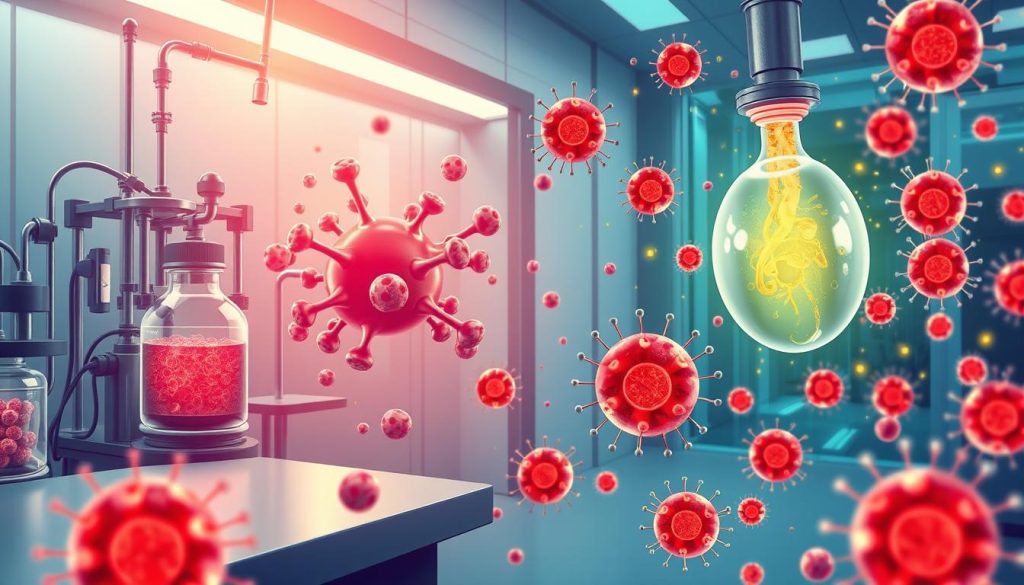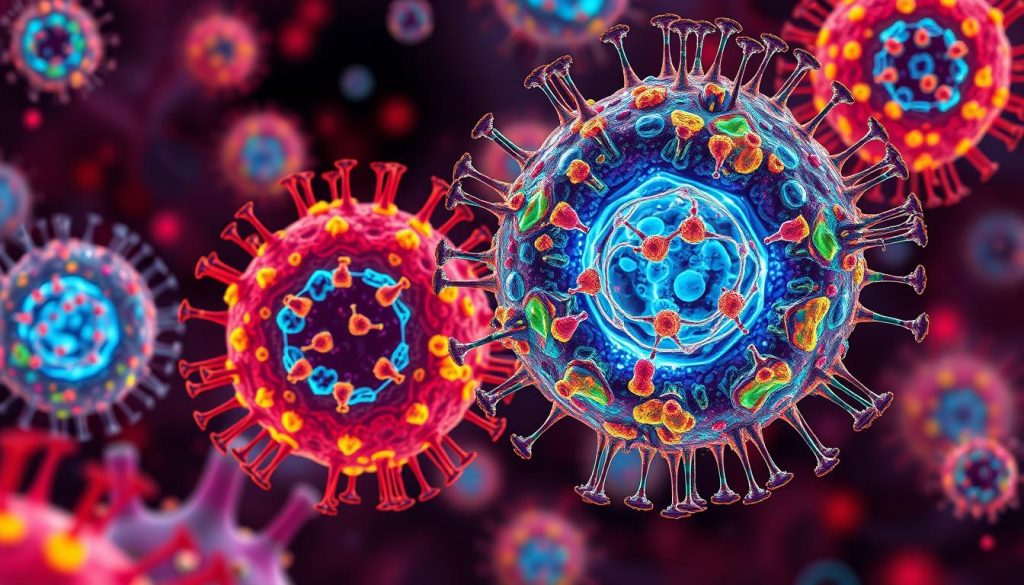Cancer treatment has seen big improvements, thanks to CAR T cell therapy. This method uses the immune system to fight cancer. It reprograms a patient’s T cells to find and kill cancer cells, giving hope to those with blood cancers like leukemia and lymphoma.
The therapy starts with taking a patient’s T cells. These cells are key to the immune response. Then, they are changed in a lab to have special receptors. These receptors help the T cells find and attack cancer cells.
After the T cells are made in large numbers, they are given back to the patient. There, they work to get rid of cancer cells.
CAR T cell therapy has big benefits. It targets cancer in a way that can lead to long-term remission. It uses the body’s immune system, making it a good option for those who didn’t do well with other treatments like chemo and radiation.
Introduction to CAR T Cell Therapy
Cancer treatment has seen a major breakthrough with chimeric antigen receptor (CAR) T cell therapy. It uses the patient’s immune system to fight cancer. This method targets and kills cancer cells with great accuracy.
CAR T cell therapy is part of adoptive cell transfer, a way to use the patient’s immune cells to fight cancer. First, T cells are taken from the patient’s blood. Then, they are changed in a lab to recognize cancer cells.
These modified T cells are then grown in the lab to create a strong force against cancer. They are put back into the patient to find and kill cancer cells. This method is less harmful than traditional treatments and can lead to long-term remission.
CAR T cell therapy has changed oncology, giving new hope to patients. It’s mainly used for blood cancers now. But, trials are looking into using it for solid tumors too.
As research goes on, CAR T cell therapy’s future looks bright. It could change cancer treatment and help many patients worldwide.
The Science Behind CAR T Cell Therapy
CAR T cell therapy is a new way to fight cancer. It uses the immune system to attack cancer cells. This therapy works by changing T cells with special receptors called CARs.
Genetic Engineering of T Cells
The CAR T cell therapy process starts with changing a patient’s T cells. T cells help fight off invaders, like cancer cells. But, cancer cells can hide from the immune system.
To find and kill cancer cells, scientists change T cells. They add a new gene that makes T cells recognize cancer cells. This gene is for a special receptor called a chimeric antigen receptor (CAR).
Chimeric Antigen Receptors (CARs)
Chimeric antigen receptors are key to CAR T cell therapy. They are made to find specific proteins on cancer cells. CARs are made from parts of antibodies and T cell receptors.
When a CAR T cell finds its target, it attacks the cancer cell. It can also multiply and stay in the body to watch for more cancer. This helps prevent cancer from coming back.
Over time, CARs have gotten better. New versions have extra parts to make them work better and safer. For example, second-generation CARs have extra parts to help them work more efficiently.
The CAR T Cell Therapy Process
CAR T cell therapy is a way to use a patient’s immune cells to fight cancer. It’s a form of adoptive cell transfer. The process starts with collecting T cells and ends with putting them back into the patient.
T Cell Collection
The first step is collecting the patient’s T cells. This is done through leukapheresis. Blood is drawn, T cells are separated, and the rest is returned.
T Cell Modification
Next, the T cells go to a lab for genetic changes. A viral vector adds a gene for a chimeric antigen receptor (CAR). This lets the T cells find and stick to cancer cells.
“The beauty of this approach is that we’re using the patient’s own cells as a drug.”
– Carl June, MD, pioneer of CAR T cell therapy
T Cell Expansion
Then, the T cells are grown in the lab. This makes millions of CAR T cells. There need to be enough to fight cancer well.
T Cell Infusion
The last step is putting the T cells back into the patient. Before, patients get chemotherapy to clear the way. This helps the CAR T cells work better.
After infusion, the CAR T cells start to grow and find cancer cells. This can go on for a long time, helping control cancer for months or years.
How Does CAR T Cell Therapy Work in the Body
CAR T cell therapy uses a patient’s immune system to fight cancer. It’s a personalized cancer therapy that changes T cells to find and attack cancer cells. T cells are a type of white blood cell.
After the therapy, the T cells multiply and look for cancer cells. When they find one, they bind and destroy it. This process keeps going, helping to fight cancer.
“CAR T cells act like a living drug, continuously monitoring for and eliminating cancer cells that express the targeted antigen.” – Dr. Carl June, pioneer of CAR T cell therapy
The main benefits of how CAR T cell therapy works are:
- It targets cancer cells well, without harming healthy ones.
- It can stay in the body for a long time, watching for cancer.
- It can fight cancer even when it tries to hide from the immune system.
As CAR T cells fight cancer, they release cytokines. These are molecules that help the immune system work better. Sometimes, this can cause a side effect called cytokine release syndrome (CRS). But, doctors can manage this.
By using the immune system’s power, CAR T cell therapy is a hopeful treatment for cancer. It’s good for patients who have tried other treatments. As research grows, CAR T cell therapy might help more people with cancer.
CAR T Cell Therapy Targets
CAR T cell therapy is a groundbreaking personalized cancer therapy. It uses a patient’s immune system to fight cancer. By engineering T cells to target cancer cells, it can kill cancer while sparing healthy cells. CD19 and BCMA are two key targets for this therapy.
CD19 CAR T Cell Therapy
CD19 is a protein on B cells, important for the immune system. But in some blood cancers, like leukemia and lymphoma, cancer cells have too much CD19. CAR T cells targeting CD19 have shown to be very effective against these cancers.
Studies have seen complete remission in up to 90% of patients with certain blood cancers. Here are the results for two FDA-approved CD19 CAR T cell therapies:
| Therapy | Cancer Type | Complete Remission Rate |
|---|---|---|
| Kymriah | Pediatric and young adult acute lymphoblastic leukemia | 83% |
| Yescarta | Adult diffuse large B-cell lymphoma | 51% |
BCMA CAR T Cell Therapy
BCMA is a protein on plasma cells, which make antibodies. In multiple myeloma, BCMA is too much, making it a good target for CAR T cell therapy.
Recent trials show BCMA CAR T cell therapy is effective against multiple myeloma. In one trial, 85% of patients responded, with 45% in complete remission. This suggests BCMA CAR T cell therapy could be a powerful tool against multiple myeloma.
“The development of CAR T cell therapies targeting CD19 and BCMA has revolutionized the treatment of certain blood cancers, giving hope to patients who have tried other treatments.”
As research goes on, new targets for CAR T cell therapy will likely be found. This could help treat more cancers with this innovative cancer treatment with car t cells.
Benefits of CAR T Cell Therapy
CAR T cell therapy is a personalized cancer therapy with many benefits. It uses a patient’s immune system to fight cancer. This can lead to long-term remission and better outcomes.
Personalized Cancer Treatment
One big plus of CAR T cell therapy is it’s made just for you. It’s not like other treatments that fit everyone the same. It starts by taking your T cells, changing them to find and kill cancer cells, and then putting them back in you.
This personalized cancer therapy is more precise. It helps avoid harming healthy cells and tissues.
Potential for Long-term Remission
Another great thing about CAR T cell therapy is it can lead to long-term remission. In some cases, patients have seen no cancer cells left in their bodies. This has happened in patients with certain types of leukemia and lymphoma, even when other treatments didn’t work.
“CAR T cell therapy has shown incredible promise in providing a personalized cancer treatment that can lead to long-term remission for patients who have exhausted other options.” – Dr. Sarah Thompson, oncologist
What makes CAR T cells special is they keep working long after they’re first given. This helps patients stay cancer-free for a long time. It’s a big hope for those who have been fighting cancer for a long time.
Limitations and Challenges of CAR T Cell Therapy
CAR T cell therapy has shown great success in treating some blood cancers. Yet, it faces several challenges. The car t cell therapy process is complex and takes a lot of time. It involves collecting, modifying, and expanding a patient’s T cells before reinfusing them.
Another big challenge is the risk of severe side effects. These can include cytokine release syndrome (CRS) and neurological toxicities. These side effects are serious and need careful monitoring by skilled healthcare professionals.
“CAR T cell therapy is a promising approach to cancer treatment, but it is not a one-size-fits-all solution. We need to continue researching and developing strategies to overcome its limitations and make it more accessible to patients.”
The high cost of CAR T cell therapy is also a major issue. The personalized cancer therapy approach makes it expensive. Here’s a comparison of its cost with other cancer treatments:
| Treatment | Approximate Cost (USD) |
|---|---|
| CAR T Cell Therapy | $375,000 – $475,000 |
| Bone Marrow Transplant | $100,000 – $200,000 |
| Chemotherapy (per cycle) | $10,000 – $30,000 |
| Targeted Therapy (per month) | $5,000 – $10,000 |
Despite these challenges, researchers and healthcare professionals are working hard. They aim to improve the car t cell therapy process and find ways to reduce side effects and costs. As they make progress, it’s hoped that personalized cancer therapy like CAR T cell therapy will help more patients.
Side Effects of CAR T Cell Therapy
Cancer treatment with CAR T cells has shown great success in treating some blood cancers. But, it can also cause a range of side effects. These CAR T cell side effects can be mild or severe and need close monitoring by healthcare professionals.
Cytokine Release Syndrome (CRS)
Cytokine release syndrome (CRS) is a common side effect of CAR T cell therapy. It happens when the immune system gets too active, releasing many cytokines into the blood. Symptoms of CRS include:
- Fever
- Chills
- Low blood pressure
- Difficulty breathing
- Fatigue
CRS can be mild or very serious. Severe cases might need intensive care and drugs like tocilizumab.
Neurological Toxicities
CAR T cell therapy can also cause neurological side effects. These can include:
- Confusion
- Tremors
- Seizures
- Aphasia (difficulty speaking or understanding speech)
These side effects usually happen in the first few weeks after treatment. They are often reversible. But, it’s important to watch closely and act quickly to avoid long-term problems.
B Cell Aplasia
B cell aplasia is a side effect of CD19-targeted CAR T cell therapies. The engineered T cells can kill both cancerous and healthy B cells. This leads to a lack of normal B cells, which are important for making antibodies. Patients with B cell aplasia are at a higher risk of infections and may need long-term immunoglobulin replacement therapy.
| Side Effect | Symptoms | Management |
|---|---|---|
| Cytokine Release Syndrome | Fever, chills, low blood pressure, difficulty breathing, fatigue | Supportive care, immunosuppressive drugs (tocilizumab) |
| Neurological Toxicities | Confusion, tremors, seizures, aphasia | Close monitoring, supportive care, corticosteroids |
| B Cell Aplasia | Increased risk of infections | Immunoglobulin replacement therapy |
While the side effects of CAR T cell therapy can be significant, doctors are working to make them less severe. As research goes on, it’s hoped that cancer treatment with CAR T cells will become safer and work for more patients.
Current FDA-approved CAR T Cell Therapies
In recent years, the U.S. Food and Drug Administration (FDA) has approved several cancer treatments with CAR T cells. These treatments have changed the game in personalized cancer therapy. They have shown great success in treating blood cancers, giving hope to those who have tried everything else.
Kymriah (tisagenlecleucel) was the first CAR T cell therapy approved by the FDA. It was approved in 2017 for kids and young adults with B-cell acute lymphoblastic leukemia (ALL). In 2018, it also got approval for adults with relapsed or refractory large B-cell lymphoma.
Yescarta (axicabtagene ciloleucel) was approved in 2017 for adults with relapsed or refractory large B-cell lymphoma. It has shown amazing results in trials, with many patients going into complete remission.
In 2020, Tecartus (brexucabtagene autoleucel) was approved for adults with relapsed or refractory mantle cell lymphoma (MCL). It’s the first CAR T cell therapy for MCL, a rare and aggressive lymphoma.
Most recently, in 2021, Breyanzi (lisocabtagene maraleucel) was approved for adults with relapsed or refractory large B-cell lymphoma. It has shown promising results, with a high rate of complete remission.
“The approval of these CAR T cell therapies marks a significant milestone in the field of personalized cancer treatment, giving hope to patients who have exhausted other treatment options.” – Dr. Steven Rosenberg, Chief of Surgery at the National Cancer Institute
As research goes on, more CAR T cell therapies are expected to be developed and approved. This will help more people with cancer, making this treatment even more life-saving.
CAR T Cell Therapy Clinical Trials
Clinical trials are key in making CAR T cell therapy better for cancer treatment. They check if new CAR T cell therapies work well in different cancers. Patients can try new treatments that are not yet common.

Many places like universities, cancer centers, and companies are doing CAR T cell therapy trials. They are looking at how CAR T cells work in blood cancers and solid tumors. Some main areas of study include:
- Improving how well CAR T cell therapies work
- Creating new CAR T cell therapies for different cancer targets
- Using CAR T cell therapy with other treatments like chemo or immunotherapy
- Lessening the side effects of CAR T cell therapy
Ongoing Clinical Trials
As of 2023, many CAR T cell therapy trials are happening worldwide. Here are some notable ones:
| Trial Name | Cancer Type | CAR Target | Phase |
|---|---|---|---|
| ZUMA-1 | Non-Hodgkin Lymphoma | CD19 | Phase 2 |
| ELIANA | Acute Lymphoblastic Leukemia | CD19 | Phase 2 |
| CARTITUDE-1 | Multiple Myeloma | BCMA | Phase 1b/2 |
| SURPASS | Glioblastoma | EGFRvIII | Phase 1 |
These trials are just a few examples of the ongoing research in CAR T cell therapy. As more trials finish, we’ll see new and better cancer treatments with CAR T cells for patients.
Eligibility for Clinical Trials
Who can join CAR T cell therapy trials depends on the trial and the cancer type. Common criteria include:
- Having a specific type and stage of cancer
- Having tried treatments that didn’t work
- Being in good health, except for cancer
- Having good organ function
Deciding to join a clinical trial is a big choice. It should be talked over with a doctor. They can explain the risks and benefits and if it’s right for you.
Patients wanting to join CAR T cell clinical trials can look on ClinicalTrials.gov or through groups like the Leukemia & Lymphoma Society. Always talk to a doctor who knows your health history and current condition before joining a trial.
Cost and Accessibility of CAR T Cell Therapy
CAR T cell therapy is a new personalized cancer therapy that gives hope to those with advanced blood cancers. But, its high cost is a big problem for many patients.
The CAR T cell therapy process is very complex. It involves taking a patient’s T cells, changing them, growing them, and putting them back in the body. This detailed process makes the therapy very expensive, costing over $400,000 per patient.
Insurance coverage for CAR T cell therapy is not the same for everyone. Some private insurers and Medicare might cover it, but patients can face big costs even with insurance.
There are efforts to make CAR T cell therapy more accessible. These include:
- Trying to make the manufacturing process cheaper
- Creating CAR T cells from healthy donors to save time and money
- Working together between pharmaceutical companies and healthcare providers to help more people get the therapy
- Offering financial help and support from treatment centers and advocacy groups
The table below shows the estimated costs of FDA-approved CAR T cell therapies:
| CAR T Cell Therapy | Estimated Cost |
|---|---|
| Kymriah (tisagenlecleucel) | $475,000 |
| Yescarta (axicabtagene ciloleucel) | $373,000 |
| Tecartus (brexucabtagene autoleucel) | $399,000 |
| Breyanzi (lisocabtagene maraleucel) | $410,300 |
“While the cost of CAR T cell therapy is high, it is important to consider the long-term benefits and the chance of lasting remissions for patients who have tried other treatments.” – Dr. James Kochenderfer, National Cancer Institute
As research gets better and manufacturing improves, the cost of CAR T cell therapy might go down. This could make it easier for more patients to get this life-changing treatment.
Future Directions in CAR T Cell Therapy
Researchers are making great strides in CAR T cell therapy. They aim to treat more cancers with this innovative treatment. They’re focusing on making better CAR T cells, using cells from donors, and treating solid tumors.

Next-generation CAR T Cells
Scientists are creating new CAR T cells that are safer and work better. They want to lower side effects and make these cells more effective at fighting cancer. They’re using safety switches, targeting multiple cancer markers, and improving how long these cells last in the body.
Allogeneic CAR T Cells
Another exciting area is allogeneic CAR T cells, made from healthy donors. This is different from current treatments that use a patient’s own cells. It could make the treatment faster and cheaper, helping more people.
| CAR T Cell Type | Source | Advantages |
|---|---|---|
| Autologous | Patient’s own T cells | Personalized, reduced risk of rejection |
| Allogeneic | Healthy donor T cells | Faster manufacturing, potentially lower cost |
Expanding CAR T Cell Therapy to Solid Tumors
While CAR T cell therapy works well for blood cancers, it’s harder to use for solid tumors. Researchers are trying to solve problems like different types of cancer cells and not enough T cells getting to the tumors. They’re looking at new ways to find cancer targets, making CARs work on more targets, and combining CAR T cells with other treatments.
- Identifying novel tumor-specific antigens
- Engineering CARs to target multiple antigens simultaneously
- Combining CAR T cells with other immunotherapies or targeted therapies
“The future of CAR T cell therapy is incredibly exciting. As we continue to refine and expand this groundbreaking cancer treatment with car t cells, we have the opportunity to help more patients.”
With more research and trials, CAR T cell therapy could change cancer treatment forever. It could bring hope and better care to people all over the world.
Comparing CAR T Cell Therapy to Other Cancer Treatments
When it comes to treating cancer, patients and their healthcare providers have several options. Chemotherapy, radiation therapy, and targeted therapies have been around for decades. But personalized cancer therapy like CAR T cell therapy has changed the game.
CAR T cell therapy is special because it targets cancer cells directly. It uses a patient’s own immune cells, modified to fight cancer. This makes it more precise than traditional treatments, which can harm healthy cells too.
But CAR T cell therapy has its own challenges. The process of preparing T cells is complex and takes time. Not all patients can get this treatment. Also, it can cause serious side effects that need careful management.
Chemotherapy and radiation therapy are more common and work for many cancers. Targeted therapies focus on specific cancer pathways. The right treatment depends on the cancer type, the patient’s health, and what’s available.
Research is pushing CAR T cell therapy to help more cancers. Trials are looking at using CAR T cells for solid tumors and making the treatment safer and more effective. By comparing CAR T cell therapy with other treatments, doctors can give patients the best care.
Patient Stories and Testimonials
For many cancer patients, CAR T cell therapy has been a beacon of hope. This cancer treatment with CAR T cells has changed lives, giving them a chance at remission. Here, we share the stories of brave individuals who have tried this groundbreaking personalized cancer therapy.
“CAR T cell therapy gave me a second chance at life. After multiple failed treatments, I thought I had run out of options. But this targeted therapy eliminated my cancer, and I’ve been in remission for two years now.” – Sarah, lymphoma survivor
Sarah’s story is not unique. Many patients have found success with CAR T cell therapy, even after other treatments have failed. This therapy’s ability to target cancer cells makes it a powerful tool in fighting various blood cancers.
The journey through CAR T cell therapy is not always easy. But the results can be life-changing. Patients often face side effects, like cytokine release syndrome. But with proper management and care, these can be overcome.
| Patient Name | Cancer Type | Treatment Outcome |
|---|---|---|
| John | Acute Lymphoblastic Leukemia | Complete Remission |
| Emily | Diffuse Large B-cell Lymphoma | Partial Response |
| Michael | Multiple Myeloma | Stable Disease |
As more patients share their experiences with CAR T cell therapy, awareness grows. These stories show the power of scientific innovation and human resilience against cancer.
Conclusion
CAR T cell therapy is a groundbreaking way to fight cancer. It uses a patient’s immune system to target cancer cells. This method has shown great success in treating blood cancers, giving hope to many.
But, CAR T cell therapy comes with challenges. It can cause severe side effects like cytokine release syndrome. These issues need careful management. Also, the high cost and limited access make it hard for many to get.
Scientists are working hard to make CAR T cell therapy better. They aim to improve its safety and use it for more cancers, including solid tumors. With new clinical trials and next-generation CAR T cells, the future looks bright. This therapy could be a major breakthrough in cancer treatment, bringing hope and long-term remission to patients everywhere.
FAQ
Q: What is CAR T cell therapy?
A: CAR T cell therapy is a new way to fight cancer. It uses the body’s own immune cells to attack cancer. First, T cells are taken from the patient. Then, they are changed in a lab to find and kill cancer cells.
Q: How does the CAR T cell therapy process work?
A: The process starts with taking T cells from the patient. These cells are then changed to find cancer. After that, they are grown in a lab. Lastly, they are put back into the patient to fight the cancer.
Q: What types of cancer can be treated with CAR T cell therapy?
A: CAR T cell therapy is approved for some blood cancers. This includes leukemia, lymphoma, and multiple myeloma. Researchers are also looking into treating other cancers with it.
Q: What are the possible side effects of CAR T cell therapy?
A: Side effects can range from mild to severe. Common ones include fever, low blood pressure, and trouble breathing. There can also be problems with the nervous system and the immune system.
Q: How long does the CAR T cell therapy process take?
A: The whole process takes several weeks. It depends on how fast the T cells multiply. This can vary from person to person.
Q: Is CAR T cell therapy a one-time treatment?
A: Usually, it’s a single treatment. But, some people might need more treatments to stay in remission. It depends on how well the treatment works for each person.
Q: How much does CAR T cell therapy cost?
A: It’s very expensive, often over 0,000. The cost can change based on the treatment and insurance. There are efforts to make it more affordable.
Q: Are there any long-term risks associated with CAR T cell therapy?
A: The long-term effects are not fully known yet. Patients need to be watched closely. This is to see how well the treatment lasts and to catch any late side effects.
Q: How can I find out if I am eligible for CAR T cell therapy or a clinical trial?
A: If you’re eligible depends on your cancer and health. Talk to your doctor. They can tell you about treatment options and where to find clinical trials.


















